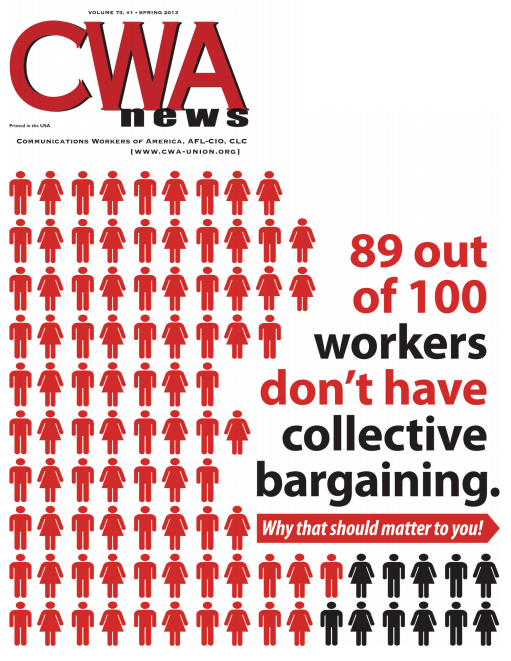Volume 73, Issue #1 | Spring 2013
All Workers Deserve Rights
In 2009, after consultation with faith and community leaders, the labor movement came together in support of a framework for immigration reform that reflects our shared values: dignity, fairness, opportunity, voice and justice.
Working Together: Bargaining Rights and Movement Building
This issue of the CWA News connects our core work of bargaining and organizing with the crucial need for a broad movement of 50 million people who will fight for economic justice and democracy for all.
In the best of times, this would be a big job.
For workers, it?s far from the best of times. The collapse of the National Labor Relations Board, caused by the failure of the Senate to adopt rules that would allow real debate and democracy on the Senate floor, means that some 80 million workers, both union-represented and non-union, have no path to workplace justice. At last count, 87 companies were challenging decisions issued by the NLRB and its regional offices. These include McDonalds and Starbucks, as well as CWA employers like CNN, Cablevision and West Penn Printing.
The CNN Case: A Decade of Injustice
This timeline shows the incredible injustice that workers at CNN have suffered. Now, with the NLRB out of commission because of the Republican abuse of the Senate rules, workers have no path to justice.
The Cablevision 22
On Jan. 30, Cablevision illegally locked out and fired 22 technicians who were simply trying to use the company's much vaunted "open-door" policy to discuss contract negotiations with management.
89 Out of 100 Workers Don't Have Collective Bargaining
Without bargaining rights, workers have no way to improve their wages and conditions and meet the power of their employers. And the decline in union membership means that bargaining is even tougher. It's as though every non-union competitor is sitting across the table from our bargaining teams.
Will Corporate America Succeed in Killing Workers' Rights and the NLRB?
The National Labor Relations Board (NLRB) was established in 1935. It is the enforcement agency for the National Labor Relations Act, the principal labor law regulating private sector employment. The Board has five members nominated by the President, and confirmed by the U.S. Senate. Currently there is only one confirmed NLRB member, but the Board needs at least three to make decisions.
